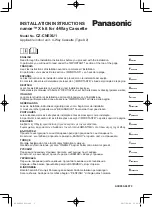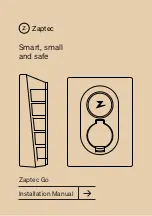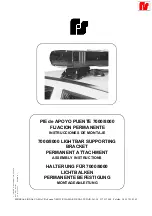
Electrical Maintenance
8-26
DEFROST SYSTEM
Initiate a unit defrost cycle during Unit Preload Operation and during scheduled maintenance inspections to test defrost system
components. To check the defrost cycle:
1. Set the thermostat to -2 C.
2. Operate the unit on cooling to drop the evaporator coil temperature below 3 C (TG-IV), 6 C (TG-V) or 7 C (TG-VI, MT
µP-IV, µP-V, µP-VI, SR-2 or SR-3).
3. Initiate a manual defrost. The unit should shift from the cooling cycle to the defrost cycle.
If the evaporator continues to cool, double check the evaporator coil temperature and refer to the Defrost Cycle Checkout
Procedure.
Check the automatic defrost timer during scheduled maintenance inspections. Refer to “Defrost Timer Checkout” in this section.
The defrost air switch setting should be checked annually. Refer to “Defrost Air Switch Checkout and Adjustment” in this
section.
Defrost Cycle
NOTE: The unit will not defrost during normal unit operation unless the evaporator temperature is below 3 C (TG-IV), 6 C
(TG-V) or 7 C (TG-VI, MT µP-IV, µP-V, µP-VI , SR-2 or SR-3).
TG-VI, MT µP-IV, µP-V, µP-VI , SR-2 or SR-3 NOTE: Defrost initiation and termination is controlled by the microprocessor
using an evaporator coil sensor.
Engine Operation
The Defrost cycle can be initiated by the manual defrost switch, the defrost air switch or the automatic defrost timer when the
defrost termination thermostat is closed.
The initiation of the Defrost cycle energises the defrost relay, pilot solenoid, damper solenoid (or damper motor) and defrost
indicator light.
NOTE: Units with a TG-VI, MT µP-IV, µP-V, µP-VI , SR-2 or SR-3 controller do hot have a defrost relay. The microprocessor
controls the pilot solenoid, damper solenoid (or motor) and the defrost indicator.
The pilot solenoid allows the three-way valve to shift and divert heated refrigerant vapor to the evaporator coil, melting frost. The
damper solenoid (or damper motor) closes the damper in the discharge opening of the evaporator housing to hold the heat within
the evaporator and prevent warm air from passing over the load.
The unit will stay in Defrost until the frost has melted and the evaporator temperature rises above 9 C (TG-IV), 11 C (TG-V) or
14 C (TG-VI, MT µP-IV, µP-V, µP-VI , SR-2 or SR-3).
Electric Operation (Model 50 Unit Only)
The Defrost cycle on electric standby operation is similar to defrost on diesel operation. An optional heater contactor and electric
heater strips can be added for increased defrosting capability. The high temperature cutout (or electronic evaporator high
temperature) switch must be closed to energise the heater contactor.
Defrost Cycle Checkout Procedure
Refer to relevant Diagnostic’s manual
Summary of Contents for SLXi Spectrum
Page 17: ...Safety Precautions 2 5 Warning Decals...
Page 18: ...Safety Precautions 2 6 Warning Decals Information Decals...
Page 74: ...Unit Description 5 30...
Page 128: ...Controller Operation 7 28...
Page 156: ...Electrical Maintenance 8 28...
Page 234: ...Refrigeration Maintenance 10 22...
Page 309: ...13 Mechanical Diagnosis TK 482 TK 486 and TK 486V Engines 13 2...
Page 316: ...Mechanical Diagnosis 13 8...
Page 322: ...Refrigeration System Diagnosis 14 6...
Page 332: ...Single Temperature Refrigeration System Diagrams 15 10...
Page 339: ...Multi Temperature Refrigeration System Diagrams 16 7...
Page 340: ...Multi Temperature Refrigeration System Diagrams 16 8...
















































